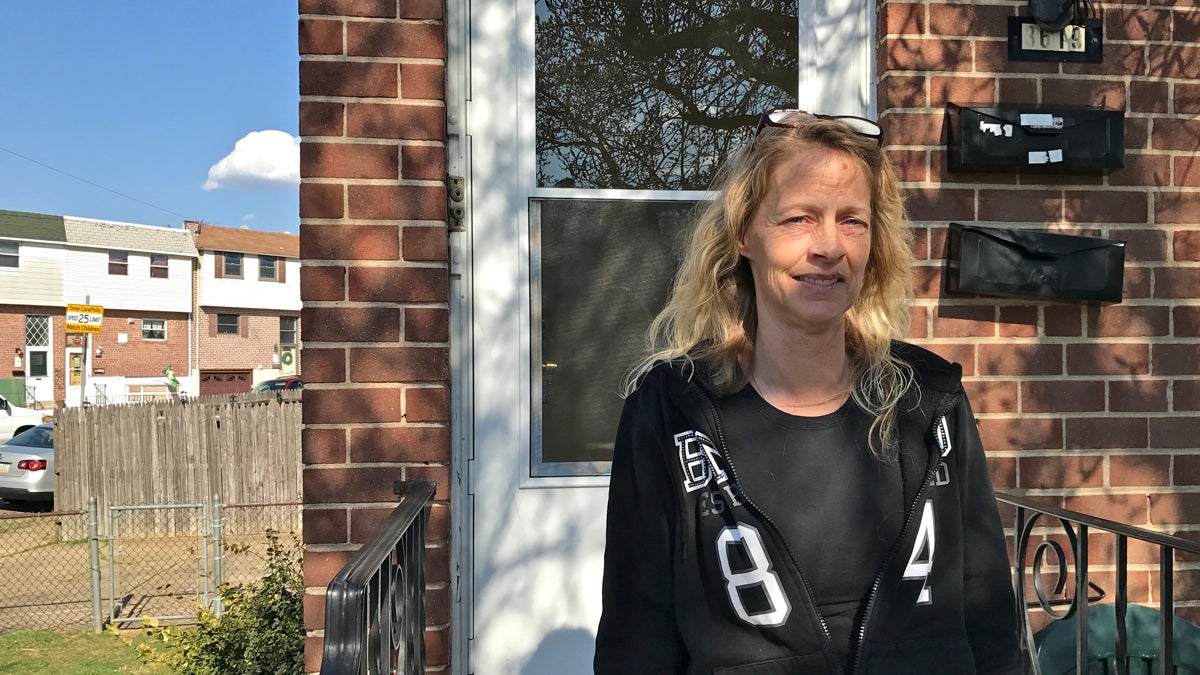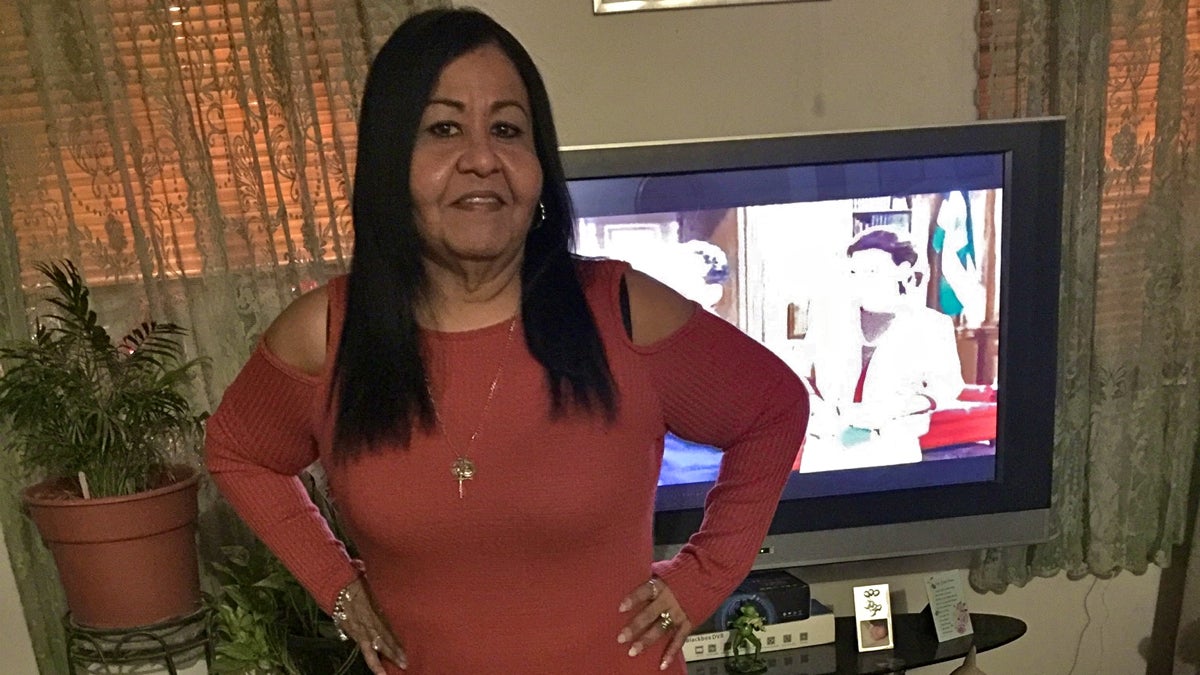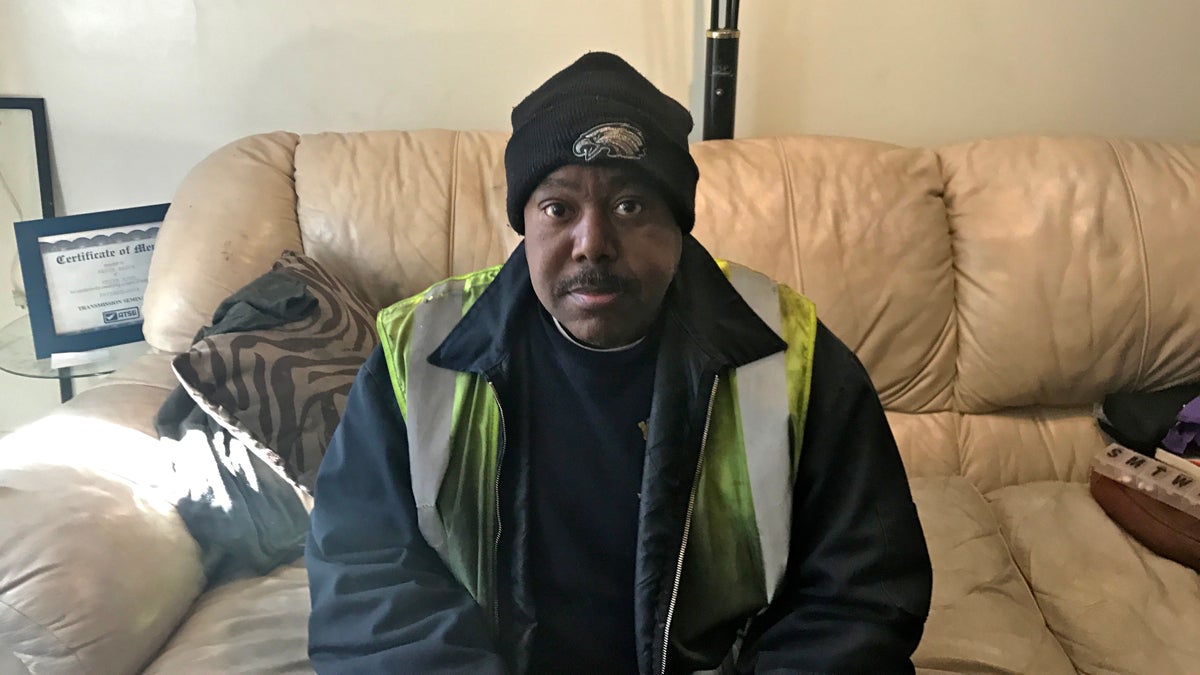Amid billions owed in student loans, U.S. taps law firms to recoup small debts from long ago
Listen 6:17
After fending off debt collectors for years, Adrienne McNally, 49, was sued by the federal government over $6,200 in student loans she took out decades ago. There is now a lien from the government on her home in Northeast Philadelphia. (Bobby Allyn/WHYY)
Adriene McNally received an unwanted gift on her 49th birthday in January: a notice that the federal government had placed a lien on her modest row home in Northeast Philadelphia.
“They actually paid someone to come out and serve me papers on a Saturday afternoon,” McNally said. “I came to the door, and he said, ‘Sorry,’ and handed me the papers.”
Back in 1984, McNally took out a federal student loan to attend beauty school. But when her mother got sick, providing care proved to be a full-time job, so McNally dropped out. Three years later, she took out a second loan to attend a different beauty school closer to home. That facility went out of business before she could complete the program.
In the end, McNally was left with about $6,200 in debt. She tried to chip away at it with income from cleaning homes and other jobs she took in between raising two children with her husband.
Fast-forward to the Great Recession. Her family fell on hard times, and McNally still hadn’t paid off the debt — despite making as many payments as as she could while juggling other expenses. In 2006, she emerged from personal bankruptcy with what she thought was a clean slate. Yet because student loan debt is nearly impossible to clear in bankruptcy, one creditor remained: the federal government.
McNally was sued in September by a private company hired by the federal government to collect on her debt. Four months later, a default judgment for $10,641 was entered on her home, valued around $164,000. The debt amount included the loan principal, plus interest that had been accumulating for the past few decades. She never replied to the suit in writing, as requested. Nor did she ever consult with an attorney, and she did not seem to know the full consequences of the court order.
“I’m just fed up with it,” McNally said. “And I think they’re just taking advantage of the small people in this country.”
Deploying a new collection tactic
From 2006 to 2014, the government had not sued more than 25 people a year in Philadelphia over student loan debt, and usually represented itself in court.
But that dramatically increased in 2015, when federal authorities — desperate to recoup a record $137 billion in student-loan defaults — brought an experimental strategy to Philadelphia that has been increasingly deployed nationwide: Using debt-collection law firms to sue borrowers, almost all of whom are low-income.
In the Philadelphia area, McNally and more than 200 other borrowers who had long ago defaulted on their student loans, have found themselves defendants in federal cases.
Already in 2017, the federal government is on track to more than quadruple the number of student-loan lawsuits, compared with the volume before private law firms were involved.
“What people are witnessing with this uptick in lawsuits is a shift in policy,” said Jennifer Schultz, an attorney with Community Legal Services of Philadelphia. “What has prompted them to make this shift? You’d have to ask them.”
Federal officials confirmed that the U.S. Department of Education has joined forces with private debt-collection law firms in 19 of the country’s 94 district courts. But officials would not call the move a change in policy.
Since 2012, more than two-thirds of the $87 million the U.S. Department of Justice has collected from those who took out student loans and then defaulted came about after federal authorities hired private debt-collection law firms, according to data Justice Department officials provided to WHYY.
Engaging private contractors for debt collection has for generations been a favorite tool of the government in attempting to recover defaulted debt. Hiring private attorneys who specialize in securing liens and other ways of forcing repayment has been used far less frequently.
In Philadelphia, federal officials hired the private law firm KML Law Group in a contract that runs through 2018, records show. The firm usually represents mortgage lenders in foreclosure proceedings, and the student-loan lawsuits represent a small, but new, slice of their debt-collection litigation business.
Experts say the ramp-up in Philadelphia likely signals future growth for debt-collection lawyers looking to reap returns for the government — and fees for themselves — by suing people who have not made good on their promise to repay the government.
“Taxpayers may be spending more on well-connected law firms than what we’re collecting from borrowers with paltry sums of unpaid student debt,” said Rohit Chopra, a former senior official at the U.S. Education Department. “This isn’t just immoral, it’s wasteful.”
Selecting debtors to pursue in court
Nationwide, the government sued 3,303 borrowers for student-loan debt since 2015, a spokesman for the U.S. Department of Justice confirmed. To be sure, that is a fraction of the 8 million borrowers now in default, or having not made a payment in at least a year. Most are dealt with in other ways before resorting to litigation.
“Education uses litigation against defaulted student-loan borrowers only when all other collection methods have failed,” U.S. Department of Education spokesman Al Betancourt said.
And the government has many powerful ways of collecting student-loan debt before ever going to court. Unlike a bank or credit card company, the federal government does not need a court order to garnish wages or take money from tax returns, Social Security, or disability benefits. It can simply tap into a borrower’s income administratively. Hundreds of millions of dollars are garnished from wages of borrowers every year.
Experts say going a step further and suing student-loan holders, as private law firms do when they win the government contracts, is seen as easy money, because the litigation is often nonadversarial — most of the time, defendants cannot afford lawyers and don’t appear in court.
Government data shows that more than 3,000 people each day default on federal student loans, raising the question: How does the government determine which borrowers to take to court?
First, borrowers with assets, such as a home, are targeted “to ensure litigation is likely to result in recovery,” Betancourt said. Otherwise, officials would not detail how they choose whose cases to pursue in court.
An examination of dozens of lawsuits provides some patterns.
In nearly every case, borrowers took out relatively small loans in the 1970s or 1980s. Until landing in the government’s legal crosshairs, some borrowers interviewed claim they had forgotten about the debt.
Nearly all of them share another thing: they are working-class residents who were never able to use higher education as a pathway out of poverty.
“In many instances, they attended training programs, like tractor-trailer driving programs. Beauty schools. Secretarial schools that gave them credentials, or did not give them a credential that they can actually translate into higher earnings,” said lawyer Joanna Darcus, who specializes in student-loan litigation at the National Consumer Law Center.
There is no statute of limitations for pursuing debt claims tied to federal student-loan debt. Once a borrower dies, the loan debt disappears. That has left some observers wondering if the new push to zero in on loan backlogs is a last-ditch effort to collect before it is too late.
To Darcus, the uptick in lawsuits is baffling because many of the people whose loan repayment is being sought often receive public assistance or have filed for bankruptcy.
“So a lawsuit at that point feels more like an intentional attack on folks who have the least ability to pay,” Darcus said.
Yet some debt-collection lawyers said some of the defaulted student-loan borrowers are playing “catch me if you can,” and have for years tried to resolutely avoid their responsibility to pay back their loans.
“It’s just trying to awaken the avoider from their slumber,” said debt-collection lawyer Drew Salaman. “Some people never want to tie up loose ends.”
‘I don’t want to lose my house’
Maribel Carrasquillo was stunned when a letter arrived in November. It read: “A lawsuit has been commenced against you.”
She attended a technical school in Philadelphia in 1984 and earned a certificate in computer programming, though the skills quickly became obsolete. So she focused on raising her kids while her then-husband, a landscaper, supported the family.
Unable to resolve a dispute with her debt servicer about payments she said she made that were not recorded, she became frustrated and stopped paying.

Maribel Carrasquillo of Philadelphia was sued over a 1984 student loan in November. She took out the loan to attend a computer-training program, but never used those skills to land a job in the field. Due to a permanent disability, she was able to have the debt discharged. (Photo provided by Maribel Carrasquillo)
She nearly forgot the loan — until the lawsuit notice arrived last year.
The principal on her loan was $2,620. But in its lawsuit against her, the federal government was demanding $8,482, for the loan plus interest.
Carrasquillo, who does not work due to a permanent mental disability, worried her home would be seized.
“I don’t want to lose my house,” she said. “That’s the first thing that came to mind. That’s the only thing I have, where to live. I don’t want to be on the street, you know.”
Losing a debt-collection lawsuit can be devastating. It tarnishes your credit score. It can make it tougher for you to get credit cards or a car loan. And a judgment entered on a borrower’s house serves as a lien.
“I describe a lien as a kind of marker on the house,” lawyer Schultz said. “And so, any time a person tries to do a transaction involving their house — a new mortgage, a refinance, or if they try to sell it — they’re going to be expected to clear up any debt that’s attached to that house.”
Once a lien is entered, the government can technically force a sale to collect money to satisfy a debt. But some debt-collection lawyers who have won contracts outside of Pennsylvania, who would only speak on the condition of anonymity, said the federal government aims only to apply pressure on borrowers, not render them homeless.
Nonetheless, fighting against these lawsuits can still provoke alarm, Darcus said.
“For folks already living on the margins financially, the fear of losing that house can be palpable,” Darcus said.
Records show that in the Philadelphia area, the government has not forced anyone out of a home as a result of an unpaid student loan, though it remains possible.
In Pennsylvania, a judgment against a property lasts for five years, but there is no limit on how often a creditor can seek to renew it.
Carrasquillo is thankful it never came to that. She filed a disability discharge form that allowed her to escape the legal fight and the debt.
Carrasquillo’s debt is a pittance compared with what many others owe, and that got her wondering why she appeared on the government’s radar.
“I know there are more people who owe more money that what I owe,” she said. “And they don’t even go after them.”
From foreclosures to student loans
Critics call the KML Law Group a “foreclosure mill.” In the public notice section of newspapers in Pennsylvania, New Jersey and Delaware, KML’s name appears regularly in announcements of distressed property transfers and sheriff’s sales.
KML was previously known as Goldbeck McCafferty & McKeever. Although, in 2011, it changed its name following a class-action lawsuit that accused it of fraudulently processing foreclosure transactions. According to the suit, paralegals forged the names of the firm’s lawyers on legal documents to hasten the process.
Thomas Puleo, a lawyer with KML, declined to comment about its government contract.
KML’s student-loan debt lawsuits rely on a formula. They start with a letter informing the borrower of the lawsuit and requesting a response within 21 days. If it goes unanswered, as typically happens, a federal judge grants a judgment by default.
Longtime debt-collection lawyer Salaman described the cost-benefit analysis of going after borrowers this way: “I think it’s called loaves and fishes,” he said. “If you cast enough bread upon the water, then some fishes nibble at it.”
But in the case of Kevin Hatch, a 55-year-old mechanic who lives in Strawberry Mansion, the federal government may be mistakenly baiting.

Kevin Hatch, 55, was recently sued by the federal government for never paying back a $3,777 student loan in 1998. There’s just one problem, Hatch says, the debt is not his. Hatch claims the U.S. Department of Education is coming after the wrong person, but he is not sure what to do about it. (Bobby Allyn/WHYY)
The $3,777 debt he was sued for over a 1988 student loan has nothing to do with him, Hatch said.
He explained that his identity was stolen decades ago and his information was used to take out loans, including federal student loans.
“I could understand them trying to get they money. But they’re barking up the wrong tree. They’re pursuing the wrong person. It’s not me,” said Hatch, who is blind in one eye and on disability.
Hatch said he was working full-time at a transmission repair shop in Delran, New Jersey, during the period the lawsuit says he borrowed the student loan.
“I never went to any school. I never stepped in no classroom,” he said. “Whatever school they’re saying this loan is for, I know nothing about it.”
Hatch’s predicament highlights what consumer advocates say is a lack of due diligence on behalf of the government-contracted lawyers, whose speedy and efficient process can skimp on pre-lawsuit vetting, critics warn.
“Only after they’re sued do they understand that they’re entitled to relief,” Darcus said. “And sometimes, full and complete discharge of their student loans. That, to me, is a signal that the litigation, even if it’s a small number of people, isn’t capturing the right people.”
In recent years, broader repayment options have become available to borrowers. There are now more income-based repayment plans to make it easier to pay back what is owed. And a loan-forgiveness program for borrowers who work in the public sector, including nonprofits, has been growing in popularity. The Consumer Financial Protection Bureau has teamed up with Department of Education programs to help borrowers sift through the plans, which can be complicated to understand.
So far, President Trump’s public statements about affordable loan repayment options and forgiveness programs have been supportive.
Still, Natalia Abrams, who leads the nonprofit Student Debt Crisis, said a larger priority for the federal government seems to be its vast network of contracted debt collectors, including the lawyers taking borrowers to court.
“The same money that we’re spending on third-party companies could be spent to properly train student-loan servicing companies to send people into repayment programs,” Abrams said. “And then the government would still be able to recoup their money.”
Back in Northeast Philadelphia, McNally, who still works as a house cleaner, said the unpaid student loans never stopped haunting her — or her children.
Before the lawsuit, debt collectors constantly called her house to demand payment. Sent her texts. Left her messages. Bombarded her with mail. For her two children, now adults, those memories resonated.
Assuming college would always be unaffordable, she said, they didn’t even try to continue their education.
“They heard the messages and stuff like that growing up as a kid. Everybody has an answering machine in their living room,” McNally said. “You play the messages and they’re threatening their mother over the phone: Pay me.”
WHYY is your source for fact-based, in-depth journalism and information. As a nonprofit organization, we rely on financial support from readers like you. Please give today.




